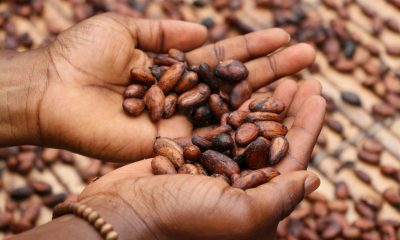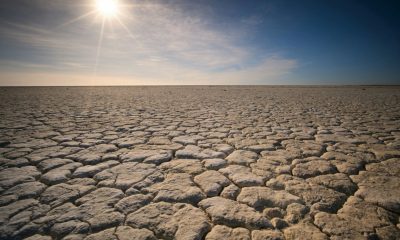Africa
How the continental free trade area is changing Africa
The African continental free trade area is an engine for regional integration and the promotion of employment in North Africa. Over the past decade, North Africa has made significant progress in economic development. In terms of Sustainable Development Goals, three North African countries are among the top five in Africa. But, they are still over 30% away from achieving the SDGs by 2030.

As a whole, Africa is halfway to achieving the a fully fledged free trade zone. North Africa has positioned itself as the second-fastest-growing sub-region on the continent with an estimated GDP increase of 3.4% in 2019. However, growth remains volatile, due to dependence on sectors, sensitive to exogenous shocks (primary sector and natural resources). Unemployment, particularly among youth and women, remains a major challenge. The unemployment rate is structurally high, averaging over 10% between 2015 and 2018.
The Born2Invest mobile app delivers breaking news and trusted, in-depth reporting from the world. Get all economic news, business strategies, and many other trending news for you to keep informed.
North Africa as a middle-income country
North Africa is currently confined to the position of “middle-income” countries and needs to address countless important issues in order to improve its positioning in the global value chain. Among other major concerns, better integration in trade, both regionally and globally need to be addressed. The resgion uffers from very low integration vis-à-vis its African neighbors, while regional exports account for less than 5% of the subregions total exports.
The African Continental Free Trade Area (ACFTA), offers a golden opportunity for North Africa to strengthen regional integration and create hundreds of thousands of new job opportunities. The positive growth prospects of the African continent can indeed turn the FTAA into an exceptional opportunity for North Africa to increase its exports of manufactured goods.
The potential to increase the GDP
Regional integration has the potential to increase the GDP of member countries by about 2-3%. As intra-African trade is projected to increase by nearly $70 billion in 2020, North African exporters could receive up to 20% of this gain. 53% of this expansion would be attributable to an increase in intra-North African trade alone and the rest to an increase in exports from North African countries to the rest of Africa.
North African countries should coordinate their policies to promote the sub-regions capacity to benefit from a free trade area. Policies should facilitate trade, finance, and investment within and across borders, particularly to build regional value chains in sectors such as textiles, food processing, and automobiles as prime examples.
Among others, these policies, should eliminate formal and informal tariff barriers, improve the regional road network, and strengthen port services that suffer from inefficiencies, bureaucratic delays and the lack of a well-defined regulatory environment.
Private sector development is key to seizing the opportunities offered by the FTAA. The private sectors in Egypt, Morocco and Tunisia are active and quite diversified but have limited financial resources. The financing gap for small and medium-sized enterprises in North Africa is estimated at around $90 billion.
Financial sector needs to focus on banks
Regional financial sector integration could contribute to strengthening competitiveness in the countries. North African countries need to focus on bank consolidation, which accounts for about 85% of total financial sector assets, strengthen financial infrastructure, harmonize regulatory policies, and remove market barriers to cross-border activities, especially exchange controls prior launching financial integration.
Once banking consolidation is on track, countries are encouraged to launch a regional financial integration initiative that includes regional payment systems to reduce the costs of cross-border transactions, and manage the risks associated with greater integration. This may also involve the creation of a fund to facilitate the financing of cross-border activities.
Financial market integration should be accompanied by a “business simplification shock” to facilitate business and investment within and across borders. Among 123 countries, Egypt, Algeria, Morocco, and Tunisia are among those with the lowest density of entry into the formal sector, suggesting that young firms may have difficulties entering markets and expanding.
The energy sector as another potential area
Another area with high potential for integration among North African countries is the energy sector. The development of an integrated energy market would help unlock the full potential of the region by filling intra-regional gaps and needs, as well as linking the sub-region to an integrated Mediterranean energy market. The developing an integrated energy market will make it possible to meet electricity demand, utilize the diversity of energy resources in the subregion and benefit from the emergence of new energy technologies.
The free trade area can play a key role in moving North African countries towards the MDGs of 2030, but it requires good policy coordination across the sub-region in order to reap the full benefits.__
(Featured image by Mike Benna via Unsplash)
DISCLAIMER: This article was written by a third party contributor and does not reflect the opinion of Born2Invest, its management, staff or its associates. Please review our disclaimer for more information.
This article may include forward-looking statements. These forward-looking statements generally are identified by the words “believe,” “project,” “estimate,” “become,” “plan,” “will,” and similar expressions. These forward-looking statements involve known and unknown risks as well as uncertainties, including those discussed in the following cautionary statements and elsewhere in this article and on this site. Although the Company may believe that its expectations are based on reasonable assumptions, the actual results that the Company may achieve may differ materially from any forward-looking statements, which reflect the opinions of the management of the Company only as of the date hereof. Additionally, please make sure to read these important disclosures.
First published in LesEco.ma, a third-party contributor translated and adapted the article from the original. In case of discrepancy, the original will prevail.
Although we made reasonable efforts to provide accurate translations, some parts may be incorrect. Born2Invest assumes no responsibility for errors, omissions or ambiguities in the translations provided on this website. Any person or entity relying on translated content does so at their own risk. Born2Invest is not responsible for losses caused by such reliance on the accuracy or reliability of translated information. If you wish to report an error or inaccuracy in the translation, we encourage you to contact us.

-

 Biotech1 week ago
Biotech1 week agoEurope’s Biopharma at a Crossroads: Urgent Reforms Needed to Restore Global Competitiveness
-

 Africa4 days ago
Africa4 days agoFrance and Morocco Sign Agreements to Boost Business Mobility and Investment
-

 Impact Investing2 weeks ago
Impact Investing2 weeks agoItaly’s Listed Companies Reach Strong ESG Compliance, Led by Banks and Utilities
-

 Fintech1 day ago
Fintech1 day agoFindependent: Growing a FinTech Through Simplicity, Frugality, and Steady Steps
























